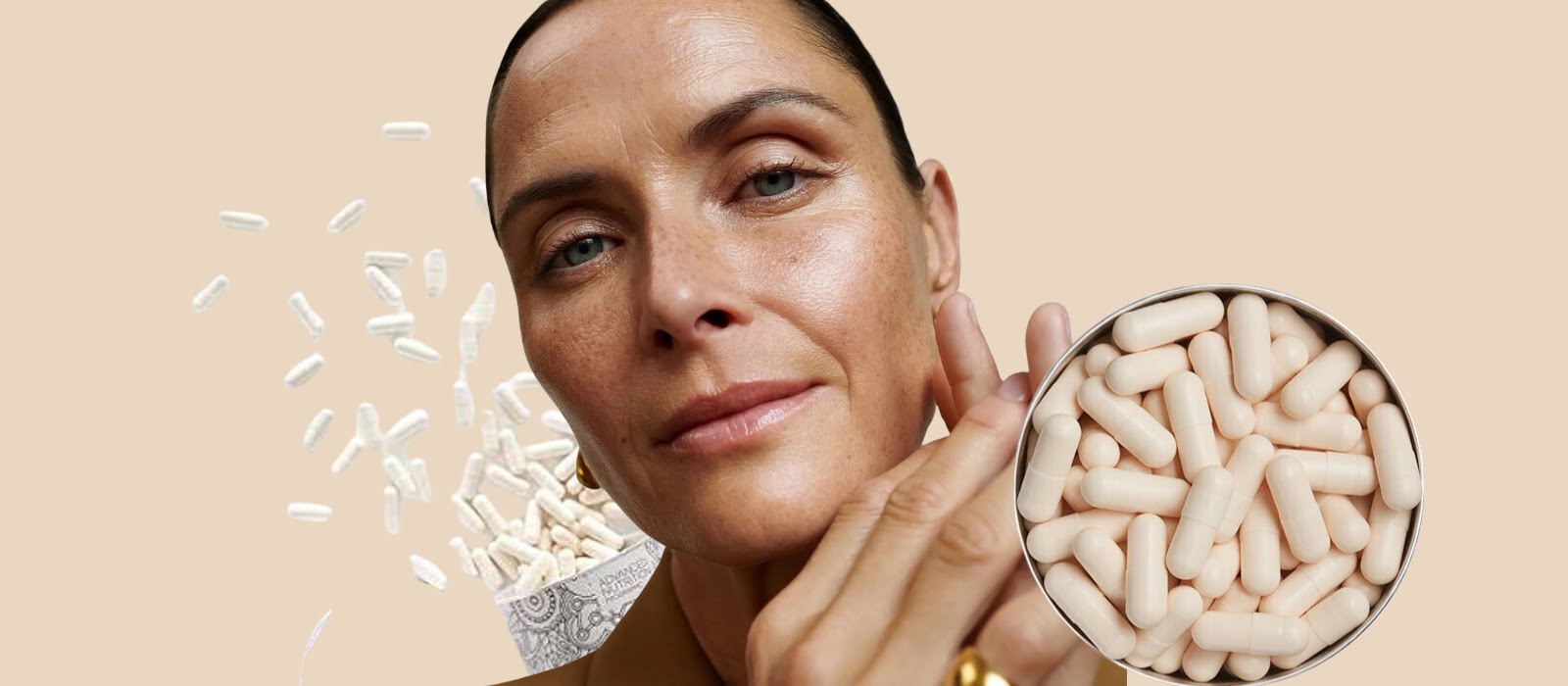
Just when you thought spots were well and truly behind you, they rear their ugly (white) head again! What to do? Dr Deirdre Fitzgerald of Fitzgerald Private Clinic breaks down the causes, treatments and ingredients to know.
Spotty skin in our forties can be representative of many issues. While the most common cause is adult-onset acne, it is, of course, important to see a medical professional if the skin’s condition is not settling with simple measures at home. Having the correct diagnosis is key. It is not uncommon for us to meet people who have previously been self-treating for acne when the underlying issue was actually rosacea or periorificial dermatitis.
So why is it that we can have clear skin for much of our adult lives, but then notice all of a sudden that our skin has changed, and not in a way that we welcome? Of course, hormonal fluctuations can play a role, as occur with perimenopause, menopause and ‘manopause’, however, acne can hit us for myriad reasons.
First step: consultation
A personalised skin consultation is something we at Fitzgerald Private Clinic Dublin & Donegal feel to be a crucial first step in effectively managing adult acne, as each person’s skin has unique characteristics and responds differently to various treatments. A one-size-fits-all approach rarely suffices because factors such as skin type, underlying health conditions, lifestyle, and environmental exposures vary widely among individuals.
Causes and identifying causes
Adult acne, a multifactorial condition, can be triggered by various internal and external factors.
Hormonal fluctuations, especially in women, often play a significant role, with changes in androgen levels leading to increased oil production and clogged pores. Medications such as the Oral Contraceptive Pill and Hormone Replacement Therapy can change these levels leading to changes in the skin. Many women in their forties also now find themselves engaging with IVF, which involves taking medication that also deliberately alters oestrogen, progesterone and testosterone levels, thereby potentially contributing to skin change.
Stress is another key contributor, as it elevates cortisol levels, which can exacerbate inflammation and oil production. Environmental factors, including lifestyle choices such as diet, skincare habits, and exposure to pollution, can exacerbate acne. Identifying these causes typically involves taking a thorough history and performing a close examination of the skin affected.
Start slow and re-establish the skin barrier
More often than not, individuals seeking help for adult acne have already inundated their skin with an array of treatments, sometimes doing more harm than good. At Fitzgerald Private Clinic Dublin & Donegal, we advocate for a more measured approach. We recommend starting slow and scaling back on aggressive treatments to re-establish the skin’s natural barrier. This helps eliminate inflammation and restore the skin’s health.
Patience is key. The efficacy of any skin intervention can really only be assessed after one to two skin cycles have passed (6-12 weeks). Reassessment at this stage should hopefully reveal a healthier and more resilient skin barrier. It is at this point that we then introduce proven, evidence-based ingredients to effectively address acne. This strategic approach not only promotes long-term skin health but also enhances the efficacy of the anti-acne protocol.
Curating a bespoke anti-acne skincare protocol
Once the skin barrier is re-established, incorporating a well-formulated retinoid becomes crucial in the fight against acne. Retinoids, derived from vitamin A, accelerate cell turnover, unclog pores, and reduce inflammation, making them highly effective in preventing and treating acne. Alongside retinoids, using an exfoliating acid such as salicylic acid can further enhance the treatment protocol. Salicylic acid, a beta hydroxy acid (BHA), penetrates deeply into the pores to dissolve excess sebum and dead skin cells, thereby preventing clogging and the formation of new acne lesions.
While both retinoids and chemical exfoliants like salicylic acid play essential roles in an anti-acne regimen, they function differently. Retinoids primarily work by promoting cellular turnover and reducing inflammation, whereas chemical exfoliants focus on removing surface debris and penetrating pores to keep them clear. Given the potency of these ingredients, personalised skin consultations are vital. The effectiveness of retinoids and exfoliating acids depends on factors such as concentration and application frequency, which can vary significantly from person to person. What works for one individual may not be suitable for another, underscoring the importance of tailored advice from a professional.
Skin Nutrition: The role of treating from the inside out
When treating acne, it’s crucial to address the issue from the inside out, as underlying imbalances often contribute to skin issues. In our clinic, we consistently see how well-formulated supplements can significantly impact the management of acne. We work closely with the Advanced Nutrition Programme, and their Skin Accumax, €119, and Skin Clear Biome, €73, duo has become a cornerstone in our treatment approach.
Skin Accumax contains a unique blend of vitamins and phytonutrient DIM. DIM (Diindolylmethane) helps manage acne by balancing hormone levels, particularly oestrogen. By supporting oestrogen metabolism and reducing excess androgens, DIM can prevent hormone-related acne breakouts, especially in adult women. Its anti-inflammatory properties also help reduce redness and swelling associated with acne.
Skin Clear Biome, on the other hand, is a specialised probiotic that targets gut health, which is linked to skin clarity. By balancing the gut microbiome and reducing inflammation, Skin Clear Biome helps calm acne from within. Together, these supplements provide a comprehensive, inside-out approach to managing and improving acne-prone skin. Skin Omegas+, €89, also by Advanced Nutrition Programme are specially formulated for skin health. As part of their specific formulation, they have integrated Vitamin A, which also acts to decrease inflammation in the skin.
Professional Treatments
Chemical peels: Once a sufficient skincare regime has been established, we recommend considering some in-clinic treatments for the most well-rounded approach. When addressing active acne, we recommend beginning with Chemical Peels. Obagi Blue Peel Radiance acts as part of an effective anti-acne protocol as the prescription-level salicylic concentration provides a powerful keratolytic and sebum-regulating effect. The anti-inflammatory ingredients like Liquorice Root and Willow Bark extracts help reduce the redness and inflammation that comes with acne. When paired with Dermalux LED Blue Light, it provides a very effective multi-modal treatment.
Dermalux LED Light Therapy: This completely non-invasive, wonderfully relaxing treatment is excellent as a stand-alone therapy, or used in conjunction with other modalities. LED Blue light 415nm is scientifically proven to reduce the skin’s bacterial load, which helps hugely with acne resolution. This is an excellent lunchbreak treatment, as it is quick and there is no downtime. What differentiates Dermalux from many home LED devices is that the Dermalux device delivers much more focused energy with a higher peak intensity and narrow waveform, which ensures more photons are delivered per second, more accurately, with greater skin absorption, leading to better and faster clinical results.
Microneedling: At Fitzgerald Private Clinic, microneedling is our go-to treatment for acne scarring due to its ability to stimulate the skin’s natural healing processes. By creating controlled micro-injuries with fine needles, microneedling triggers collagen and elastin production, which are essential for repairing and rejuvenating the skin. This process not only helps to smooth out uneven skin texture but also reduces the appearance of acne scars over time. Unlike more invasive procedures, microneedling has minimal downtime and is suitable for all skin types, making it a versatile and effective option for those seeking to improve the appearance of acne scars.
Radiofrequency Microneedling: This is microneedling with, you guessed it, concomitant radiofrequency energy. This means that at the exact moment that the microneedle is in the dermis, a controlled burst of energy is also released, causing a double-stimulation of Collagen and Elastin remodelling, which can prove very effective for deeper, more severe acne-related scarring.
In summary
A consultation where a thorough history is taken and a detailed skin examination is performed will save treatment time and money in the long term. Spotty skin in our 40s is far more common than people think, but it is manageable and can be improved massively when the correct treatment is chosen. Less is often more in this situation.
The Fitzgerald Private Clinic is the winner of the IMAGE Best Aesthetic Clinic of the Year 2023. fitzgeraldprivateclinic.com



















